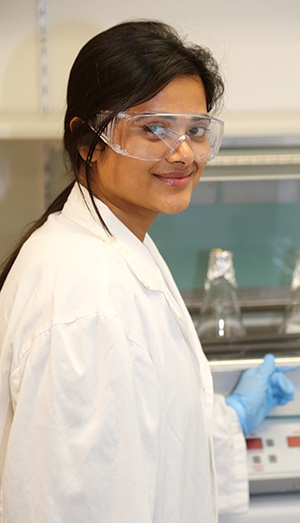Fuelling a greener tomorrow
Research news
An Indian-based Deakin student is exploring the potential of a unique bacteria for producing biofuel.
A rare form of bacteria collected from a hot spring in a Himalayan cave is offering hope for a cleaner planet.
A Deakin University microbiologist, Nisha Singh, undertook a challenging trek to such a remote location to pursue her dream of finding a way to efficiently produce biofuel in India and other parts of the world.
The harvested bacteria she is working on has unique properties that are paving the way for production of ethanol directly from biomass (dry plant matter), for use as biofuel. Ethanol is carbon neutral – a green fuel that can be blended with petrol or used in pure form.
“Microbiologists have discovered that high-altitude habitats, undisturbed by human activity, have tremendous bacterial diversity,” she said.
As part of her PhD, Ms Singh is currently undertaking a six-month research project with Dr Munish Puri, a leading researcher in the field of industrial biotechnology, based in the Bioprocessing Laboratory within Deakin’s Centre for Chemistry and Biotechnology at Waurn Ponds.
She is completing most of her Deakin PhD in India, through the innovative Deakin India Research Initiative, launched in 2012. This arrangement provides Indian students with access to Deakin’s world class research expertise – and industry experience in India, in this case, with Indian Oil Corporation.
“India can’t devote the land needed to produce corn or sugar cane, which is being used as a source of biofuel in countries like the USA and Latin America, but we do have agricultural waste, such as rice or wheat straw, that is high in cellulose, plentiful and suitable for ‘second generation’ biofuel production,” she said.
Dr Puri explained that biomass is the raw material most widely available for producing biofuels (bio-ethanol). It is normally obtained from virgin biomass (forest residues such as trees and grass), waste biomass (agricultural by-products), organic wastes or energy crops.
In India, limited space means that virgin biomass or energy crops are not an option. Waste biomass from grains and sugarcane is plentiful.
While most research in this field has centred on using fungal enzymes for processing biomass to create bio-ethanol, Ms Singh and Dr Puri believe the bacteria she is studying will be more appropriate for a cost efficient process in the future.
“Biofuel will be used widely around the world as energy demands increase,” said Dr Puri.
“Apart from use in cars and trucks, we are now seeing experimental flights using biofuel. In early June Alaska Airlines fuelled a commercial plane from Seattle to San Francisco, with a blend of traditional jet fuel and 20 per cent Gevo biofuel, made from fermented corn.
“In the European Union, there is a mandate that by 2020, 10 per cent of transport fuel will come from renewable sources such as biofuels.
“IndianOil is one of the premier energy organisations in India, with access to the whole Indian market. The relationship between Deakin and IndianOil means that, together, we can extend our research to the industrial scale.”
The arrangement began with a Memorandum of Understanding signed in 2011. Ms Singh is now IndianOil’s fourth Deakin PhD student and is based at the Indian Department of Biotechnology and Indian Oil Corporation’s (DBT-IOC) Centre for Advanced Bioenergy Research in Faridabad.
“Spending this time at Deakin has been fantastic,” she said.
“I have been able to collaborate with world class experts, gain experience in academic writing and begin a new phase of research – investigating the unique enzyme system of this bacteria, so we can take the next step in making biofuel in India a reality.”
Share this story

Key Fact
Science explorer: Ms Nisha Singh is studying for a Deakin PhD in Microbiology.
